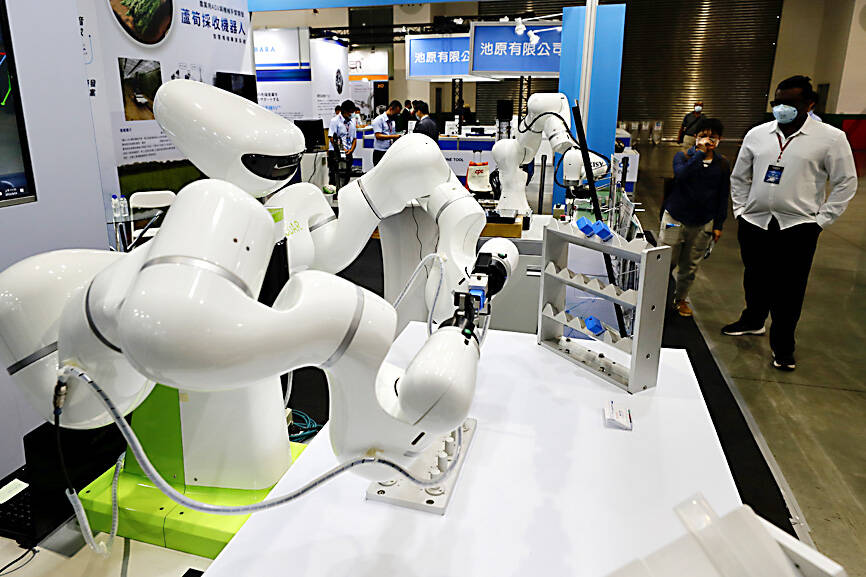Taiwan’s machinery exports last month fell 21.7 percent year-on-year, dropping for a 12th straight month, the Taiwan Association of Machinery Industry said in a report yesterday.
The decline was in line with the extended contraction in the nation’s overall outbound shipments, which fell 10.4 percent annually during the same period.
Machinery exports totaled US$2.65 billion last month, down from US$3.38 billion a year earlier, data compiled by the association showed.

Photo: Ritchie B. Tongo, EPA-EFE
However, on a monthly basis, machinery exports increased 11.04 percent from US$2.38 billion, the data showed.
The association attributed the annual contraction last month to manufacturers remaining conservative about investment amid a global economic slowdown.
China’s weaker-than-expected economic recovery and US interest rate hikes also weighed on Taiwanese exports, as the two countries are Taiwan’s largest export markets, it said.
Orders received by local machinery makers started to shrink in August last year when global demand slowed, but last month’s annual decline in exports was smaller than June’s 22.5 percent contraction, the association said.
Furthermore, overseas shipments of inspection and testing equipment, electronic equipment and machine tools were higher than the previous month, indicating that demand for such products remains rigid and the impact of inventory destocking is decreasing, it added.
In the first seven months of the year, machinery exports slid 19.4 percent year-on-year to US$17.01 billion, the association’s data showed.
The US was the largest buyer of Taiwanese machinery products in the first seven months, with purchases totaling US$4.09 billion, accounting for 24 percent of Taiwanese exports.
China ranked second, with purchases totaling US$3.94 billion for a 23.1 percent share of Taiwanese exports.
In third place was Japan, with purchases totaling US$1.38 billion and accounting for 8.1 percent of the total, the data showed.
The association said that it is cautiously optimistic about the industry’s near-term outlook, as manufacturing investment enters its peak season and inventory adjustment gradually comes to an end.
Replacement demand on the back of the global energy-saving and carbon-reduction trends should also drive the industry, it said.
The government’s policy to stimulate domestic demand should further boost order momentum for local machinery makers, the association said.

‘SWASTICAR’: Tesla CEO Elon Musk’s close association with Donald Trump has prompted opponents to brand him a ‘Nazi’ and resulted in a dramatic drop in sales Demonstrators descended on Tesla Inc dealerships across the US, and in Europe and Canada on Saturday to protest company chief Elon Musk, who has amassed extraordinary power as a top adviser to US President Donald Trump. Waving signs with messages such as “Musk is stealing our money” and “Reclaim our country,” the protests largely took place peacefully following fiery episodes of vandalism on Tesla vehicles, dealerships and other facilities in recent weeks that US officials have denounced as terrorism. Hundreds rallied on Saturday outside the Tesla dealership in Manhattan. Some blasted Musk, the world’s richest man, while others demanded the shuttering of his

ADVERSARIES: The new list includes 11 entities in China and one in Taiwan, which is a local branch of Chinese cloud computing firm Inspur Group The US added dozens of entities to a trade blacklist on Tuesday, the US Department of Commerce said, in part to disrupt Beijing’s artificial intelligence (AI) and advanced computing capabilities. The action affects 80 entities from countries including China, the United Arab Emirates and Iran, with the commerce department citing their “activities contrary to US national security and foreign policy.” Those added to the “entity list” are restricted from obtaining US items and technologies without government authorization. “We will not allow adversaries to exploit American technology to bolster their own militaries and threaten American lives,” US Secretary of Commerce Howard Lutnick said. The entities

Minister of Finance Chuang Tsui-yun (莊翠雲) yesterday told lawmakers that she “would not speculate,” but a “response plan” has been prepared in case Taiwan is targeted by US President Donald Trump’s reciprocal tariffs, which are to be announced on Wednesday next week. The Trump administration, including US Secretary of the Treasury Scott Bessent, has said that much of the proposed reciprocal tariffs would focus on the 15 countries that have the highest trade surpluses with the US. Bessent has referred to those countries as the “dirty 15,” but has not named them. Last year, Taiwan’s US$73.9 billion trade surplus with the US

Prices of gasoline and diesel products at domestic gas stations are to fall NT$0.2 and NT$0.1 per liter respectively this week, even though international crude oil prices rose last week, CPC Corp, Taiwan (台灣中油) and Formosa Petrochemical Corp (台塑石化) said yesterday. International crude oil prices continued rising last week, as the US Energy Information Administration reported a larger-than-expected drop in US commercial crude oil inventories, CPC said in a statement. Based on the company’s floating oil price formula, the cost of crude oil rose 2.38 percent last week from a week earlier, it said. News that US President Donald Trump plans a “secondary